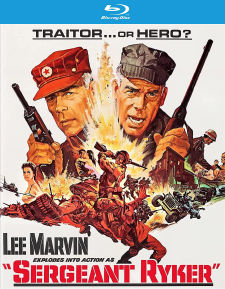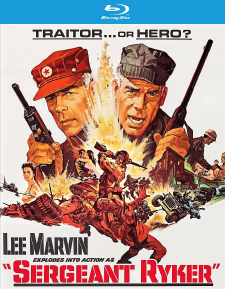Sergeant Ryker (Blu-ray Review)

Director
Buzz KulikRelease Date(s)
1963 (January 10, 2023)Studio(s)
Universal Pictures (Kino Lorber Studio Classics)- Film/Program Grade: B-
- Video Grade: B
- Audio Grade: B+
- Extras Grade: B-
Review
Buzz Kulik’s Sergeant Ryker was released theatrically in 1968, roughly eight months after star Lee Marvin had a major hit with The Dirty Dozen, and Universal Studios took great pains to remind audiences of that film. The posters for Sergeant Ryker openly mimicked the design of the ones that MGM had created for The Dirty Dozen, promising a lurid tale of adventure and hard-hitting action for unsuspecting viewers. The problem was, Sergeant Ryker is nothing of the sort. It’s actually a low-key courtroom drama that Kulik had originally shot for television in 1963—a fact that Universal went to great pains to disguise in their marketing materials. Like others studios in that era, Universal frequently mined television productions for potential theatrical release. They had already done so with another Lee Marvin vehicle in 1964, Don Siegel’s adaptation of The Killers, after NBC decided that it was too violent for broadcast. Sergeant Ryker required a bit more reworking than that film did, but Universal still brought it to the big screen in 1968 in an attempt to capitalize on the success of The Dirty Dozen. Yet The Dirty Dozen was an anomaly, not a trend, as it was one of the few war-themed films that become a hit during the Vietnam era. No amount of deceptive marketing was ever going to give Sergeant Ryker that kind of fame and fortune, and so it’s often unfairly overlooked today.
Sergeant Ryker began life as a two-part episode of the Kraft Suspense Theatre on NBC, titled The Case Against Paul Ryker. Rather than simply joining the two halves together for theatrical release, Universal instead slightly restructured them, with a bit of extra stock footage added in to punch things up. (It’s not clear if either Kulik or original editor Robert B. Warwick were involved in that process.) Still, nothing essential was changed from the story as devised by screenwriters Seeleg Lester & William D. Gordon. Sergeant Ryker (Marvin) has been convicted of treason and sentenced to death during the Korean War, despite his claims of having been on a secret mission at the behest of an officer who was later killed in action. Ryker’s wife Ann (Vera Miles) convinces the prosecuting officer Captain Young (Bradford Dillman) that Ryker didn’t receive a fair trial, and so Young pushes for a new one, offering to serve as defense counsel instead. Yet proving Ryker’s innocence wont’ be easy, especially since the soldier frequently acts as his own worst enemy. Sergeant Ryker also stars Murray Hamilton, Peter Graves, Norman Fell, and Lloyd Nolan.
Despite the original full-frame image having been cropped for widescreen, there’s no question that Sergeant Ryker looks like a made-for-television movie. To be fair, though, that was just Buzz Kulik’s style. Even the films that he directed specifically for the big screen, like The Hunter, still retain that same kind of straightforward, unadorned visual approach. So, it’s perhaps more accurate to say that Sergeant Ryker looks like a Buzz Kulik film—and there’s nothing wrong with that, either. He certainly elicited fine performances out of his cast, with Ryker being the kind of morally ambiguous role that Marvin was born to play. That ambiguity extends to the story itself, with questions of guilt or innocence falling into the post-Anatomy of a Murder world where nothing is black or white, and everything is instead covered by shades of grey. Despite the Korean War setting of Sergeant Ryker, that was an appropriate level of ambivalence for a film that was actually released during the Vietnam War. It certainly fit into the ethos of the era, where it no longer seemed clear who the heroes really were. That was still a hard sell in 1968, and so Sergeant Ryker failed to find much of an audience, but it’s still an essential step in the process of Hollywood starting to openly question the nature of wartime heroism.
Cinematographer Walter Strenge shot Sergeant Ryker on 35 mm film using spherical lenses. It was originally shown full-frame for television broadcast in 1963, but it was matted to 1.85:1 for theatrical release in 1968. The compositions rarely feel too cramped at 1.85:1, so Strenge definitely protected for a potential theatrical release all along (it just took longer to get there than anyone could have expected). This version is taken from a 2K scan of the theatrical 35 mm interpositive. The opening title sequence looks particularly rough because of its combination of stock footage and optical printing, but things improve significantly once they’re over. There are a few optical transitions throughout the film that are also soft, as well as a handful of optically zoomed-in shots, but the rest of the footage is reasonably sharp and detailed. It’s not free of damage, though, as there are light scratches and speckling visible at times, plus a few fleeting larger blotches. The colors are strongly saturated, arguably too much so at times, as the flesh tones are sometimes excessively ruddy. It’s still in keeping with the look of television cinematography from the era, however.
Audio is offered in English 2.0 mono DTS-HD Master Audio, with optional English subtitles. While it sounds a little thin at times, the dialogue is always clear—that’s one of the advantages of the fact that it was a made-for-television production, shot almost entirely on soundstages. The limited musical score was composed by a thirty-year-old John Williams, credited here (like most of his early work) as “Johnny.”
Kino Lorber’s Blu-ray release of Sergeant Ryker comes with a reversible insert featuring two different versions of the film’s sensationalistic (and wildly deceptive) theatrical artwork, as well as the following extras:
- Audio Commentary by Daniel Kremer
- Trailer (HD – 2:05)
- Prime Cut Trailer (HD – 2:34)
- Gorky Park Trailer (Upscaled SD – 2:24)
- To Hell and Back Trailer (SD – 2:53)
- Attack! Trailer (SD – 2:31)
- Paths of Glory Trailer (HD – 3:03)
- Time Limit Trailer (HD – 3:16)
- The Great Escape Trailer (HD – 2:45)
- Shamus Trailer (HD – 3:04)
Filmmaker and historian Daniel Kremer does a nice job of breaking down the convoluted production history of Sergeant Ryker, and he describes many of the differences between he television version and the theatrical cut. He expands from there to cover the way that Universal and other studios repackaged television material during that era, including a breakdown of the journey that other projects took from the small screen to the silver screen. He provides biographical information for Kulik and the key members of the cast, and also recaps what “Johnny” Williams had been up to prior to that point. Kremer reads from some one of the reviews at the time that pointed out the television origins of Sergeant Ryker, and talks about the way that Universal tried to obfuscate those origins in their press materials. It’s a valuable commentary for anyone who wants to learn more about the story behind the story of Sergeant Ryker.
Kino Lorber continues to do the Lord’s work in bringing forgotten titles out of obscurity an into full high-definition glory, and Sergeant Ryker is no exception to that rule. Buzz Kulik is a director who’s never gotten enough love, so it’s great to see that Kino has given him some with this release. It’s recommended for Kulik fans (all two or three of us), but also for anyone interested in the history of the cross-pollination between the worlds of television and theatrical filmmaking.
- Stephen Bjork
(You can follow Stephen on social media at these links: Twitter and Facebook.)

